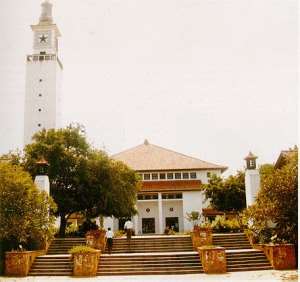
THE University of Ghana has admitted 143 full-fee paying students for the 2001/2002 academic year, representing 2.4 per cent of the total enrolment of 5,986 students.
They are made up of 103 for Humanities, 23 for Administration, 10 for the Sciences and seven for Medicine.
Students undertaking Medicine are paying ¢14,839,524; Sciences ¢8,704,964 and Humanities ¢5,014,445.
Documents, however, tumbled upon by the Graphic indicate that a total of 205 students were offered admission on condition of full-fee payment.
They comprise 180 for Humanities, 15 for Medicine and 10 for the Sciences.
All those who were offered fee-payment admissions were also made to sign an undertaking to continue to pay the fees until they complete their course at the university or have their admissions terminated.
Investigations by the Graphic have also revealed that the Universities of Science and Technology and Cape Coast have been implementing this policy for the past two years.
It is, however, learnt that some of the students, upon entering second year, refuse to pay the fees. It was also gathered that taking a cue from the two universities, the authorities of the University of Ghana have made the students to sign an undertaking to pay the fees throughout their stay on campus or have their admission terminated.
The Vice-chancellor of the University of Ghana, Professor Ivan Addae-Mensah, said at the matriculation ceremony of the university last Saturday that the question of fee payment would have to be dealt with, since government subventions to unversities have reduced over the last decade and yet the universities were expected to increase intake to meet national manpower requirements.
“We have either had to find ways of surviving or be marginalised in the global advancements in university education, or perish,” he stated.
He said the Committee Vice-Chancellors and Principals (CVCP) had discussed the issue of full-fee paying and approved it in principle and that some of the universities have even been implementing the policy for many years.
Explaining the rational behind the policy, Prof Addae-Mensah said the university decided to allocate some of the unutilised foreign student quota to categories of Ghanaian students who, though fully qualified, did not meet the cut-off points, provided they would pay fees, “a practice that had been going on in other institutions for years without attracting any adverse comments or criticisms from any quarters.”
He said instead of charging the full students fee of between $2,000 and £8,000, the university decided that such categories of students would pay the “highly subsidised fees by the National Council for Tertiary Education for calculating budgetary allocations, which is about ¢5 million for the Humanities, about ¢8.7 million for the Sciences and ¢15 million for Medicine.”
He said this category of admissions did not in anyway compromise the chances of any Ghanaian who met the official cut-off point, for admission.
“It is, therefore, very painful indeed and incomprehensible, to hear some of the very vitriolic language that has been used on the airwaves and in the papers to criticise us for implementing a policy that had been agreed upon by the CVCP long ago, and had been implemented for some time by other universities without eliciting the sort of venom that we are now being subjected to,” he stressed.
Recently, at a forum organised by the Ford Foundation in Uganda, where he delivered a paper on innovations and management of universities, Prof Addae-Mensah is quoted as saying that the university is determined to free government from its obligation of providing subventions to the universities.
He said this was a hard but necessary decision to implement, because government has failed to meet its obligations to the universities.
He said the move is to let government concentrate on policy matters so that the universities will decide on how to meet its obligations to provide quality education.




 There’s nothing you can do for us; just give us electricity to save our collapsi...
There’s nothing you can do for us; just give us electricity to save our collapsi...
 Ghanaian media failing in watchdog duties — Sulemana Braimah
Ghanaian media failing in watchdog duties — Sulemana Braimah
 On any scale, Mahama can't match Bawumia — NPP Youth Organiser
On any scale, Mahama can't match Bawumia — NPP Youth Organiser
 Never tag me as an NPP pastor; I'm 'pained' the 'Akyem Mafia' are still in charg...
Never tag me as an NPP pastor; I'm 'pained' the 'Akyem Mafia' are still in charg...
 Your refusal to dedicate a project to Atta Mills means you never loved him — Kok...
Your refusal to dedicate a project to Atta Mills means you never loved him — Kok...
 2024 elections: I'm competent, not just a dreamer; vote for me — Alan
2024 elections: I'm competent, not just a dreamer; vote for me — Alan
 2024 elections: Forget NPP, NDC; I've the Holy Spirit backing me and nothing wil...
2024 elections: Forget NPP, NDC; I've the Holy Spirit backing me and nothing wil...
 2024 elections: We've no trust in judiciary; we'll ensure ballots are well secur...
2024 elections: We've no trust in judiciary; we'll ensure ballots are well secur...
 Performance tracker: Fire MCEs, DCEs who document Mahama's projects; they're not...
Performance tracker: Fire MCEs, DCEs who document Mahama's projects; they're not...
 Train crash: Railway ministry shares footage of incident
Train crash: Railway ministry shares footage of incident
